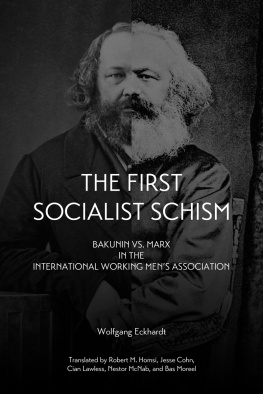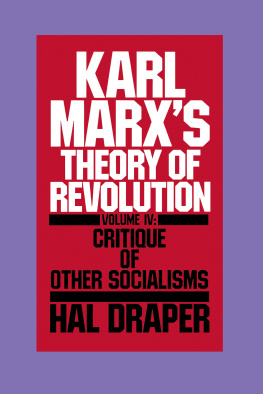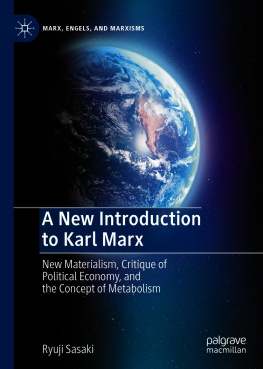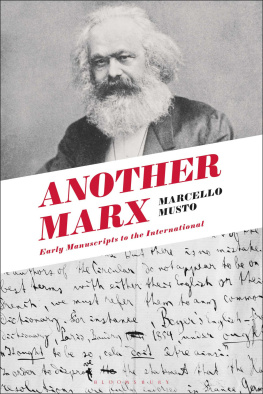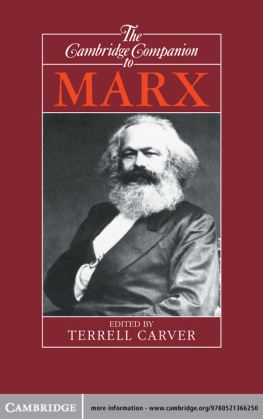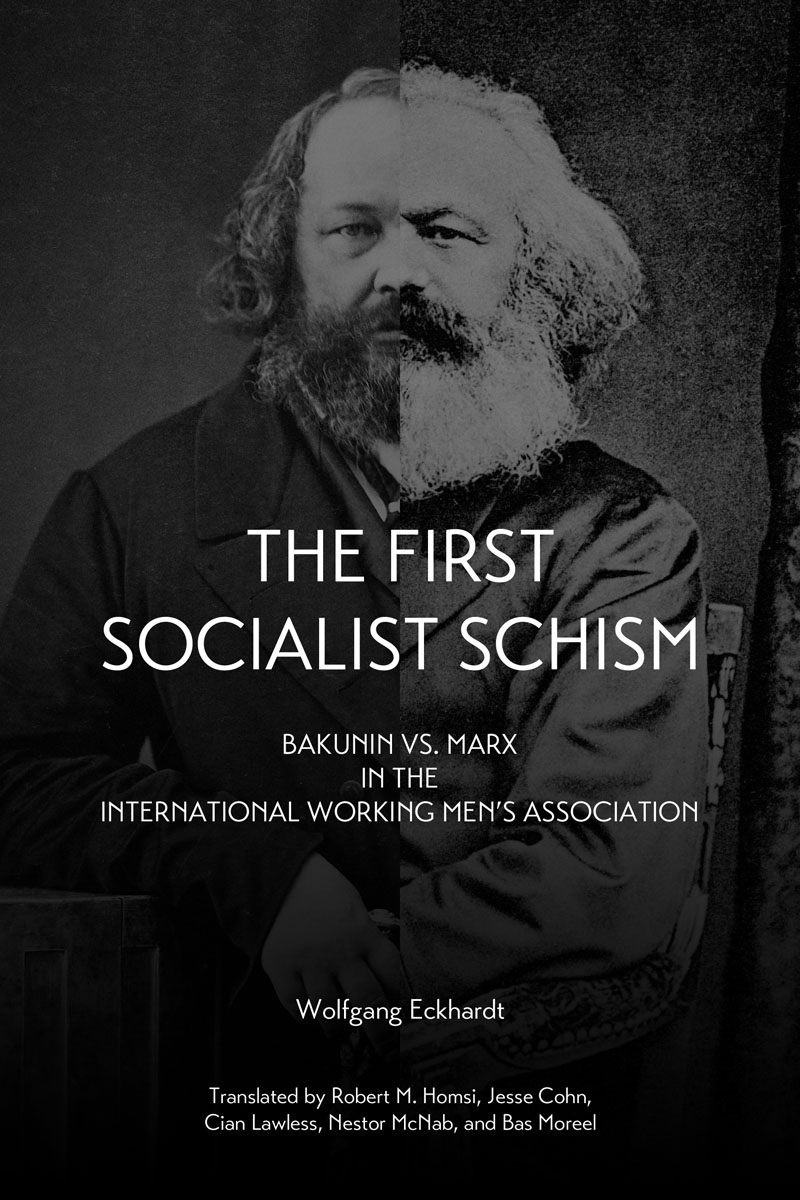
The First Socialist Schism: Bakunin vs. Marx in the International Working Mens Association
Wolfgang Eckhardt 2016
This edition published in 2016 by PM Press
ISBN: 978-1-62963-042-7
Library of Congress Control Number: 2014908069
Cover: John Yates/Stealworks.com
Layout: Jonathan Rowland
PM Press
P.O. Box 23912
Oakland, CA 94623
thoughtcrime ink
C/O Black Cat Press
4508 118 Avenue
Edmonton, Alberta
T5W 1A9 Canada
10 9 8 7 6 5 4 3 2 1
Printed in the USA by the Employee Owners of Thomson-Shore in Dexter, Michigan www.thomsonshore.com
This book has been made possible in part by a generous donation from the Anarchist Archives Project.
I am profoundly grateful to Jrg Asseyer, Gianluca Falanga, Valerii Nikolaevich Fomichev, Frank Hartz, Gabriel Kuhn, Lore Naumann, Felipe Orobn Martnez, Werner Portmann, Michael Ryan, Andrea Stei, Hanno Strau, and Michael Volk for their support and to the translators named above for their excellent job creating this English edition of my book.
Contents
C HAPTER 1
Bakunin, Marx, and Johann Philipp Becker
I T WOULD HAVE BEEN DIFFICULT TO imagine at first that one day Mikhail Bakunin (18141876) and Karl Marx (18181883) would face one another as the heads of opposing tendencies of international socialism. They were nearly the same age and both emigrants who had settled in Paris between 1843 and 1844, and were part of the same group of international radicals that had congregated in Paris a melting pot for European emigrants before 1848 at the time. There they were introduced to one another in March 1844 and had a friendly relationship until Marx was expelled from France in January 1845. Despite some tribulations for example, Marxs Neue Rheinische Zeitung accused Bakunin of being a Russian spy in 1848 they continued to correspond well into the 1860s.
The commonly held notion that Marx was the main founder of the International
Marx sent Bakunin the Inaugural Address, published a short time after their meeting in London, to Italy (where Bakunin had moved).
The Alliance request by Johann Philipp Becker (November 1868)
Bakunin became a member of the Geneva central section of the International in June or July 1868.
The Internationals congress, which had taken place a few days earlier in Brussels, declared to the League on 12 September 1868 that their existence next to the International was unjustified and suggested that the Leagues members should join one section or another of the International.
Even though the Alliance claimed to be established entirely within the big International Working Mens Association in their preambles, who was part of the Central Office (bureau central) of the Alliance, was given this task. Bakunin wrote:
Citizen J. Phillippe Becker, a member of this office, a personal friend of the members of the General Council, and to some extent influential among them, was unanimously entrusted by all the other members of the Office (Brosset, Bakunin, Perron, Gutat, Duval and secretary Zagorski) to write to London. He accepted this mission, certain, he said, of the success of his approach, and added that the General Council, which had no right to refuse us, would necessarily understand, after the explanations which he gave them, the immense utility of the Alliance. We thus relied completely on the promise and assurance of Ph. Becker []. The fact is that contrary to all his promises he had written nothing to London, or that he had written something completely different from what he had told us.
Becker had in fact written a letter to London; however, it was not exactly a request for the Alliances admittance to the International. In his letter to the General Council on 29 November 1868, he wrote, more or less matter-of-factly:
In addition, we have been instructed to inform you that an International Alliance of Socialist Democracy has formed within our Association, whose programme is enclosed. Its local section has 145 members to date, and will soon have many hundreds more. As the existing sections and affiliated groups of our Association have almost exclusively been treating symptoms their consumer establishments, bakery, butcher and chandlery, and the protection of employees wage and have let our primary mission out of their sights, the time has come for an element to arise and rally together to bring some healthy idealism and revolutionary energy into the movement on the continent before it is too late. It had already begun to get boring for energetic natures. And history cannot do without an avant-guard. A few words of encouragement and support in your response to this Alliance would have a positive effect.
Beckers rather smug letter surprisingly resulted in Marxs first verbal attack against Bakunin. On the evening that Beckers letter was received by the London General Council of the International, Marx wrote to Engels:
Mr Bakunin in the background of this business is condescending enough to wish to take the workers movement under Russian leadership.
This shit has been in existence for 2 months. Only this evening did old Becker inform the General Council about it in writing. [] As old Becker writes, this association should make up for the deficient idealism of our Association. Lidalisme Russe!
Marxs frivolous preoccupation with the conspiracy theory that Bakunin had used Becker as a marionette to take the workers movement under Russian leadership is almost bizarre. In reality Bakunin had no idea what Becker had written to London.
After receiving the letter, Marx commented on it to Engels: Bakunin is still under the pleasant misapprehension that he will be allowed to go his own way. was quickly confirmed.
The Alliance joins the International (FebruaryJuly 1869)
The Central Office of the Alliance responded to the rebuttal by the General Council on 26 February 1869 with the suggestion that the Alliance dissolve as an international organisation. The General Councils letter from March 1869, written by Marx, states:
The galisation des classes [equalisation of classes], literally interpreted, comes to the Harmony of Capital and Labour (lharmonie du capital et du travail) so persistently preached by the Bourgeoissocialists [sic]. It is not the logically impossible equalisation of classes, but the historically necessary superseding abolition of classes (abolition of classes) [sic], this true secret of the Prolet. movement, which forms the great aim of the Int. W. Ass. Considering, however, the context, in which that phrase galisation des classes occurs, it seems to be a mere slip of the pen, and the General Council feels confident that you will be anxious to remove from your programme an expression which offers such a dangerous misunderstanding.
Marx also spoke of a slip of the pen in a draft of this text that he sent to Engels. Three months before the critic from the General Council, Bakunin had already offered Marx an explanation of this phrase in his letter from 22 December 1868 (where he had also sent the Alliances programme):
Nonetheless, I must heartily avow, we would have done better expressing ourselves differently if, for example, we had spoken of the radical abolition of the economic causes of the existence of different classes, the equalisation of the economic, social and political environment, and the conditions needed for all individuals to live and develop without distinction of gender, nation and race.
Next page
